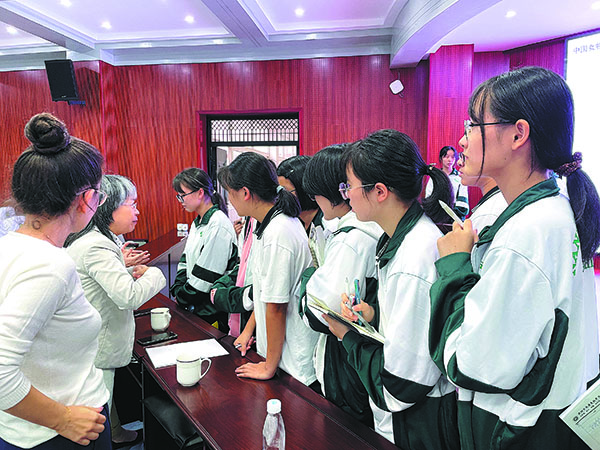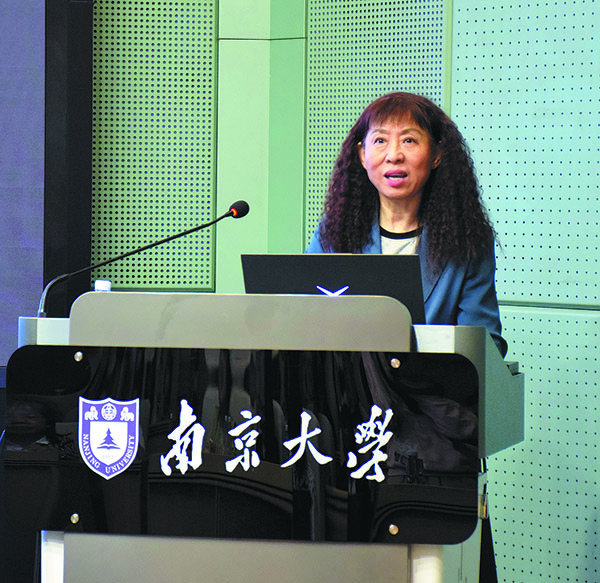 Female physicists answer questions from students during a lecture tour event in Nanjing, Jiangsu province, in October. [Photo provided to China Daily]
Female physicists answer questions from students during a lecture tour event in Nanjing, Jiangsu province, in October. [Photo provided to China Daily]Academician strives to make the science subject more popular to help make China a technological powerhouse, Yan Dongjie reports.
The Chinese Academy of Sciences recently announced the results of this year's election of academicians, which is the highest academic honor in the field of science and technology in China. Among the 59 academicians who were elected in November, only five are women.
One of them is Jin Kuijuan, who was elected as an academician in the field of mathematical and physical sciences. She believed she has a special responsibility in addition to scientific research.
"I hope that the honor bestowed on me today will inspire more female high school and college students to love physics and enter the field to contribute their knowledge to the country's scientific development," Jin said. "Women may be more meticulous, have better intuition, and tend to be more resilient, all of which contribute to the further development of physics."
As the director of the Commission on Women in Physics of the Chinese Physical Society, Jin organized large-scale surveys that calculated the proportion of female college students, graduate students, associate professors and professors in the field of physics in the country to be approximately 30 percent, 20 percent and 10 percent, respectively.
"As the level rises, the number of women in physics decreases," she said. An important reason for these falling numbers, according to Jin, is that after a certain age, women begin allocating more time and energy to family responsibilities and children's education. "Research in physics requires wholehearted dedication, to the extent that women slow down or even switch careers when they are unable to balance their family life and career," she said. "However, the in-depth development of physics requires women, their unique perspectives and intuition will promote the further improvement of physics."
 Jin Kuijuan, a physicist and an academician from the Chinese Academy of Sciences, addresses attendees during a speech tour promoting women's role in science at Nanjing University in Nanjing, Jiangsu province, in October. [Photo provided to China Daily]
Jin Kuijuan, a physicist and an academician from the Chinese Academy of Sciences, addresses attendees during a speech tour promoting women's role in science at Nanjing University in Nanjing, Jiangsu province, in October. [Photo provided to China Daily]To increase the participation of women and girls in science education, vocational training and research activities worldwide, the United Nations Educational, Scientific and Cultural Organization marked Feb 11, 2016, as the International Day of Women and Girls in Science.
Jin hoped to strengthen women's resolve in pursuing physics, while also encouraging them to play a greater role in technological development. Every year, she organizes weeklong tours in which women physicists visit different provinces and give free lectures to encourage more women to fall in love with physics and its wonders.
This year marks the 10th anniversary of this activity, and women physicists have already visited 10 provinces to showcase the charm of physics.
Jin said that in recent years, the support women scientists get in China has been rising. For example, funding institutions such as the National Natural Science Foundation of China and the Outstanding Youth Funds have relaxed age restrictions for women considering the time they devote toward raising a family. The official website of the NNSFC shows that from next year the age limit for women researchers to apply for the National Outstanding Youth Science Fund will be raised from 45 to 48 years.
As the vice-chair of the International Union of Pure and Applied Physics, Jin quoted IUPAP President Michel Spiro as saying: "Basic sciences explore the soul of the Universe." This statement, she said, "captures the essence of basic science in exploring the development laws of the natural world".